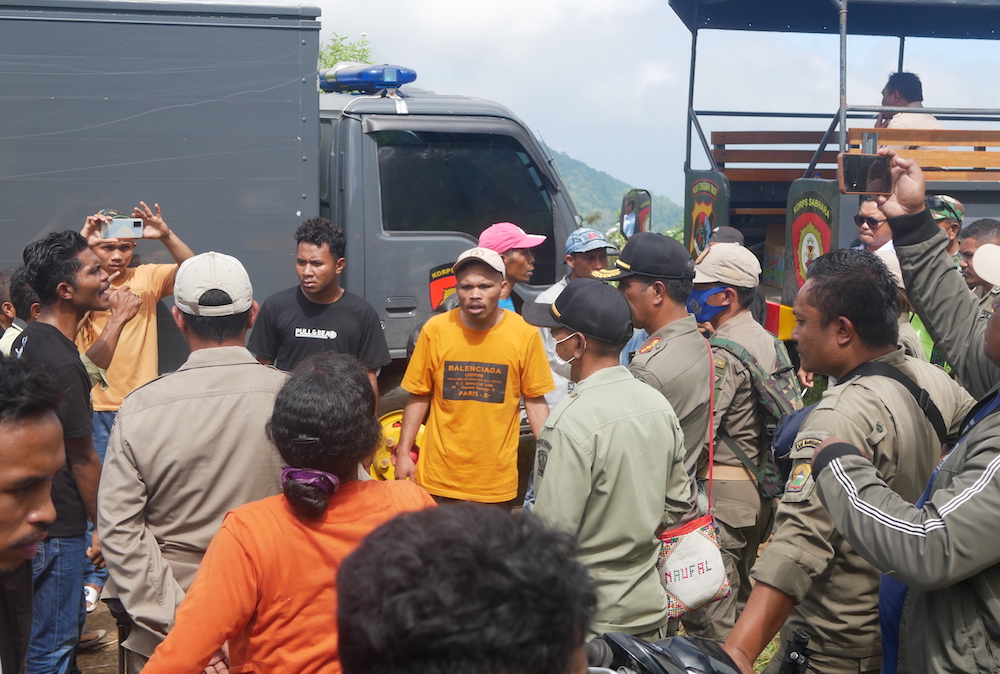Villagers in Indonesia’s East Nusa Tenggara province accuse police of committing violence when they protest against land measurements for a Germany bank-funded geothermal project on their customary land.
Servasius Masyudi Onggal, a villager from Poco Leok, Manggarai Regency on Flores island said dozens of villagers were victims of beatings when they held protests for two days on June 20-21.
“While the others had minor injuries, three of them were seriously injured. Two people are currently being treated at the local clinic, while a man who was seriously injured will undergo follow-up examinations at the hospital,” he told Floresa on June 22.
Onggal sent a number of videos showing villagers, including women screaming hysterically trying to stop a team from the state-owned PT State Electricity Company [PT PLN], which was working on the project, under heavy police and military guard.
He said the incident occurred at Lingko Tonggong, one of the well pad drilling points.
Onggal said residents have been on guard at the location since June 9, when PT PLN first started setting stakes on residents’ lands.
“In the last few days, tensions have been escalating, with more security forces deployed to the location,” he said.
The geothermal project, funded by Germany’s bank Kreditanstalt für Wiederaufbau (KfW) is an expansion of the Ulumbu power plant, about three kilometers to the west of Poco Leok, with a target of increasing it to 40 megawatts from the 10 currently in operation.
Onggal said the villagers rejected the project because the drilling point locations were close to their customary land and houses.
Paulina Imbut, a woman who participated in the protest said, “the deployment of the security forces to their area has made us feel insecure.”
“Every time we wanted to go to the fields, information appeared that the security forces apparatus would come, we had to cancel our plans to work in the fields,” she said.
Marsianus Gampu, an activist from the Ruteng Branch of the Indonesia Catholic Student Association strongly criticized the repressive actions taken by the police.
“The presence of the security forces should act as mediators between those who are pro and against the project, not to be present to support one of the parties that has the potential to trigger new conflicts,” he said.
Father Marthen Jenarut, head of Ruteng Diocese’s Justice, Peace and Integrity of Creation Commission said although geothermal is claimed as a new and renewable energy source and is categorized as a clean and environmentally friendly energy source and its sustainability is guaranteed, there is a hope that the government and investors will continue to “respect the basic rights of the local community.”
“The people have the basic right to life, the right to a comfortable living space, the right to welfare, the right to maintain their cultural identity as an indigenous community entity with all its authority and the right to justice,” he said.
Meanwhile, Manggarai district police chief AKBP Edwin Saleh claimed that their presence at the location was to secure projects that were categorized as national strategic programs.
“It is a state project, not a private sector. In this case the police have the duty and responsibility to secure the implementation of the project,” he told reporters on June 22.
He also claimed that the police did not take any repressive measures, only carried out the necessary protection.
Siswo Hariyoni, the head of the Manggarai National Land Agency said that they would continue to carry out the measurement of land, claiming it was a national strategic project.
“This project will continue. We can’t wait for all the problems to be resolved,” he said.
Flores has been the target of various geothermal projects since its designation as a geothermal island in 2017.
According to the Ministry of Energy and Mineral Resources, the island has a total geothermal potential of 902 megawatts or 65% of the geothermal potential in East Nusa Tenggara province. The potential is spread over 16 points along the island.
However, the development of these projects continued to trigger protests from residents, after one of the project points in Mataloko, Ngada Regency failed and was abandoned, while the former drilling hole continued to emit hot mud up to 500 meters to 1 km from the drill point which damaged the residents’ agricultural land.


